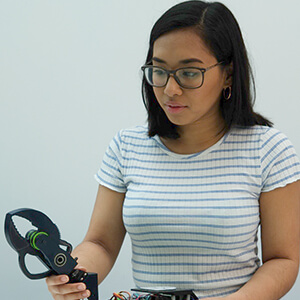I chose to study Product Design Engineering as the course specification included mechanical engineering fundamentals with a mixture of design and creative modules. It was also accredited by the Institution of Mechanical Engineers (IMechE) which suited me at the time because becoming a chartered engineer was also on my radar.
The facilities at Loughborough and access to the equipment definitely benefited me during my course as it gave me the opportunity to bring ideas to life and get a more hands on experience with the course, by applying the theory learnt during lectures.
During my course I was able to develop a lot of skills which benefit me both in the workplace and the more technical skills required in industry. I learnt how to work efficiently both individually and as part of a group, and how to manage my time effectively. In terms of the more technical skills, I learnt how design and development cycles work (including product requirements and specifications) and some of the more general topics including 3D printing, manufacturing processes, designs for manufacturing (DfM), and fundamentals such as mechanics of materials, fluid mechanics and finite element analysis (FEA).

During my placement year, I worked at a design consultancy in Cambridgeshire, 42 Technology. I realised that Cambridge is a hub for engineering and that upon graduating, I wanted to return; this motivated to work hard in my final couple of years, as I knew how competitive it would be to secure a role in Cambridge. I was excited to graduate with a first class degree, and immediately after graduating I worked as a Product Design Engineer at Videojet Technologies, where I was able to get a grasp of engineering in a global company with a well-established product (they are a market leader in CIJ printers). During my time there, I learnt that I wanted to pursue a career in mechanical design with a product that has more scope for development.
I am now working as a Graduate Mechanical Engineer at Cambridge Medical Robotics / CMR Surgical.
My day-to-day role includes the design and development of consumables, such as surgical instruments that are used with the CMR Surgical Versius System, a medical robotic system used to assist in minimal access surgeries.
My course was really helpful in securing this role. There were some key modules that gave me the knowledge required for me to do well in technical interviews, and some of the project work completed during my degree offered real examples of applications of theory, which gave me plenty to talk about during interviews.